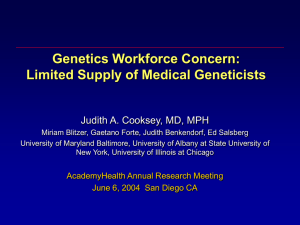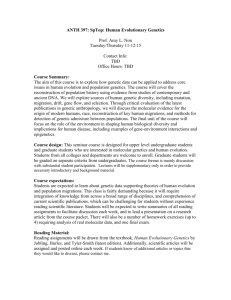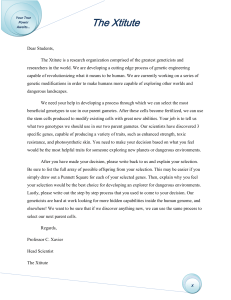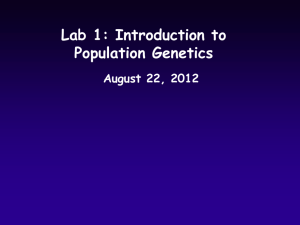Assessing Genetic Services and the Health Workforce (2001 - 2004)
advertisement
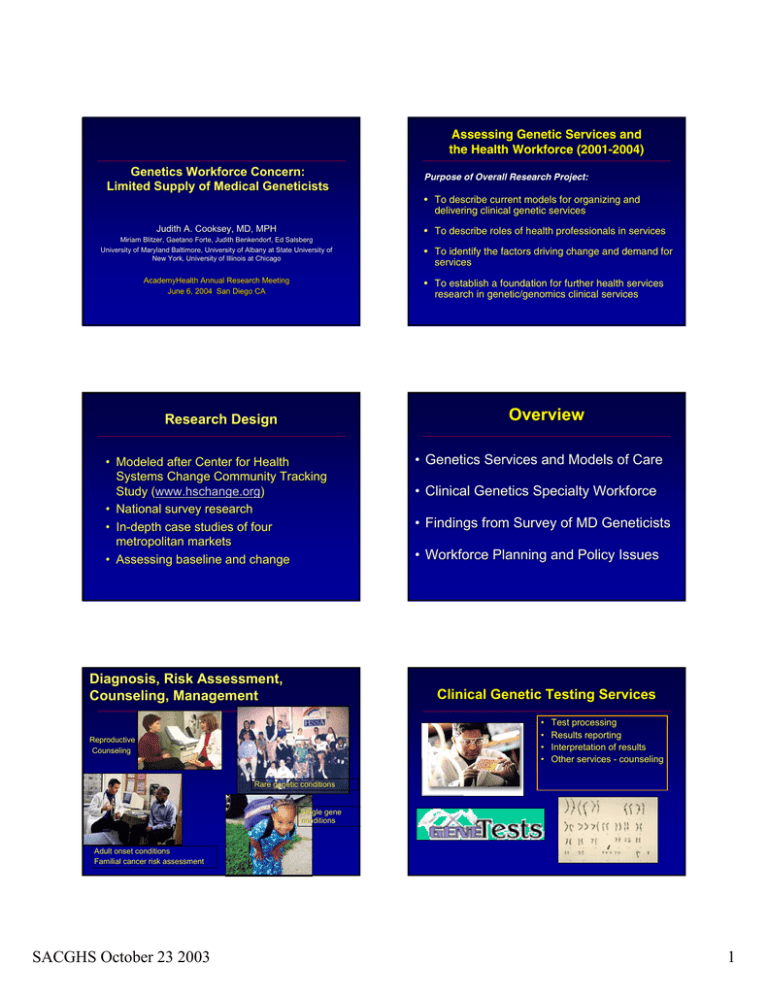
Assessing Genetic Services and the Health Workforce (2001(2001-2004) Genetics Workforce Concern: Limited Supply of Medical Geneticists Purpose of Overall Research Project: • To describe current models for organizing and delivering clinical genetic services Judith A. Cooksey, MD, MPH • To describe roles of health professionals in services Miriam Blitzer, Blitzer, Gaetano Forte, Judith Benkendorf, Ed Salsberg University of Maryland Baltimore, University of Albany at State University of New York, University of Illinois at Chicago AcademyHealth Annual Research Meeting June 6, 2004 San Diego CA • To identify the factors driving change and demand for services • To establish a foundation for further health services research in genetic/genomics clinical services Overview Research Design • Modeled after Center for Health Systems Change Community Tracking Study (www.hschange.org (www.hschange.org)) • National survey research • InIn-depth case studies of four metropolitan markets • Assessing baseline and change Diagnosis, Risk Assessment, Counseling, Management • Genetics Services and Models of Care • Clinical Genetics Specialty Workforce • Findings from Survey of MD Geneticists • Workforce Planning and Policy Issues Clinical Genetic Testing Services • • • • Reproductive Counseling Test processing Results reporting Interpretation of results Other services - counseling Rare genetic conditions Single gene conditions Adult onset conditions Familial cancer risk assessment SACGHS October 23 2003 1 Models of Care for Clinical Genetics 1. Traditional genetics clinic Models of Care for Clinical Genetics 4. Public Health/State Sponsored Screening and Services - newborn screening, genetic outreach clinics - geneticists and genetic counselors 2. Combined clinics - medical specialist, geneticist, genetic counselors, others 3. Other medical specialist provides genetic services to patient (not family) 5. Laboratory Sponsored Services - lab director or genetic counselor reports/interprets results to referring MD - pre - test counseling - Obstetrician (MFM), oncologist, etc - often genetic counselors Concern: Downward Trend in New Diplomates Specialists in Genetics Medical/Clinical Geneticists ~ 1,970 certified MDs & PhDs, GME 4 yrs or PhD 2yr post- doc Genetic Counselors ~ 2,100, MS in Genetic Counseling 1990 1993 1996 1999 2002 MD Clinical Genetics 134 136 123 89 69 Laboratory Genetics 76 195* 128 85 77 210 331 251 174 146 Total ABMG Diplomates Nurses in Genetics * new laboratory specialty added ~ 300 clinical specialists,, various education and roles- genetic counseling, care coordination Medical Specialty Board Certificates Medical Geneticist Survey (ABMS Certificates, can hold more than one) All Specialties Internal Medicine Pediatrics Obstet/Gynecology Radiology Pathology Allergy/Immunology Medical Genetics* • Counts each certificate SACGHS October 23 2003 < 1993 1993-2002 517,000 238,400 116,200 50,200 32,100 32,000 21,900 3,700 1,304 69,200 27,100 11,700 12,400 5,400 1,185 1,016 • Written survey of all ABMG diplomates – Conducted Jan 2003, excluded the 2002 diplomates – Mailed to 1,594 diplomates with US addresses, 56% RR , weighted values presented • Estimated active board certified geneticists – 1,377 diplomates active in genetics, 926 MD (or MD/PhD) and 451 PhD • Demographics and Education – – – – 50% women, mean age 52 years, Few from minority groups (9% Asian, 4% - Black, Hispanic, Other) highly educated (21% of MDs also had PhD) MDs GME: 72% Pediatrics 11% Internal Med 11% Ob/Gyn Ob/Gyn 6% Path 2 Geneticists’ Primary Work Setting Academic Medical Center Hospital Commercial Lab Med Practice/HMO Other settings All 62 MDs 66 PhDs 55 9 9 10 10 9 2 13 10 10 22 3 10 Geneticists – % Time Effort All MDs PhDs n=1,377 n=926 n= 451 31 22 21 9 10 7 44 9 21 9 10 7 4 50 22 8 11 4 Patient Care Clinical Lab Research Education Administration Other Overall 87% of MDs and 16% of PhDs report at least some patient care time (not nec faceface-toto-face care) Patient Care Geneticists Professional Work Patterns All Hours worked per week MDs (face(face-toto-face pt care) PhDs 52 54 50 Reproductive patients < 40 hrs/wk 8% 8% 7% Infants, children, adolescents > 60 hrs/wk 35% 43% 21% Adults Wait time for new pt < 1 mo Income (median) $123,000 $135,000 $101,000 New patient visits per year Visit time: new patient Follow-up visits per year Visit time: follow-up patient Medical Geneticists • Small medical specialty, with few new entrants • Most practice in AHCs, hospitals, practices/labs • Geneticists may practice as generalists or limit practice, 85% practice practice with genetic counselors • Limited professional time in patient care with almost 50% time in in research, education, administration • Modest numbers of new patient visits per year, but time intensive intensive visits for complex cognitive services. Few followfollow-up/return visits. • Majority are pediatrics trained – will this change in future ? • Will clinical genetics remain a specialty or become a subspecialty subspecialty within larger specialties (e.g. such as obstetricians with MFM training) training) SACGHS October 23 2003 All Pt Care Geneticists n=676 Pediatrics trained n=470 Int Med, Ob/Gyn 11% 75% 8% 81% 68% 5% 10% 45% 350 88 min 27% 62% 510 64 min 270 45 min 390 33 min 13% 52% 380 85 min 290 43 min Other medical n=155 Critical Concerns • Human genome project completed sequencing in 2003 • Explosion of basic science and technology research • Highly complex science, evolving • Will change paradigms of health, disease, and health care planning • Chasm between potential impacts vs current level of health services and policy research • Timeframe unclear 3 Broader Planning/Policy Questions Re: Assure Adequate Genetics Workforce • Training program support • Profession of genetic counselors • Roles for advanced practice nurses in genetics • Clinical applications: medical specialists, pharmacists, therapists, others • Further research on models of care- allows research across professions Research Team • • • • • • • • • • • • • • Judith Cooksey, PI Miriam Blitzer, Blitzer, CoI Ed Salsberg, Salsberg, CoI LauraLaura-Mae Baldwin, CoI Judith Benkendorf Dale Lea Julie Mansour Helen Travers Gaetano Forte Pamela Saunders Cynthia Gordon Dan Beckett Patsy Flanagan Kimberly Moore University of Maryland Baltimore and HRSA Funded Workforce Research Centers at • State University of New York, Albany • University of Illinois at Chicago • University of Washington • University of Texas Health Science Center at San Antonio • HRSA Project Officer – Sarah Richards • Strategic planning by medical geneticists Research Project Funders (9/01 – 9/04) Health Resources and Services Administration (HRSA) – Bureau of Health Professions (BHPr), Office of Workforce Planning and Analysis – Maternal Child Health Bureau (MCHB), Genetic Services Branch Thank you! NIH National Human Genome Research Institute (NHGRI) - Ethical, Legal, and Social Implications (ELSI) Program Findings Across Models of Care • Clinical geneticists – Work in teams with genetic counselors, medical trainees, multimulti-specialty clinics – Family history, lab test ordering, and interpretation skills – Practice as generalist geneticists with specialization in subset of disorders, keep up with new clinical entities/tests – Outpatient with varying inin-patient consults – including NNIUC, PICU • Genetic test availability influences demand/providers – Availability & demand for tests Æ demand for services – medical specialists engagement SACGHS October 23 2003 Findings Across Models of Care (2) • Diffusion of medical innovation/technology Academic health centers specialists (researchers & complex referrals) Æ Medical specialists Æ Primary care physicians • Market factors are important drivers – Organizational history, leadership, support – Competition and corporatization – Reimbursement design • Limited therapies- now diagnostic, prognostic and management – Future change may be dramatic with targeted effective therapeutics 4

